‘A declaration of independence’: How NewsNation landed a Republican debate
Experts say the choice of NewsNation as host for the latest Republican debate signals a fractured US media landscape.
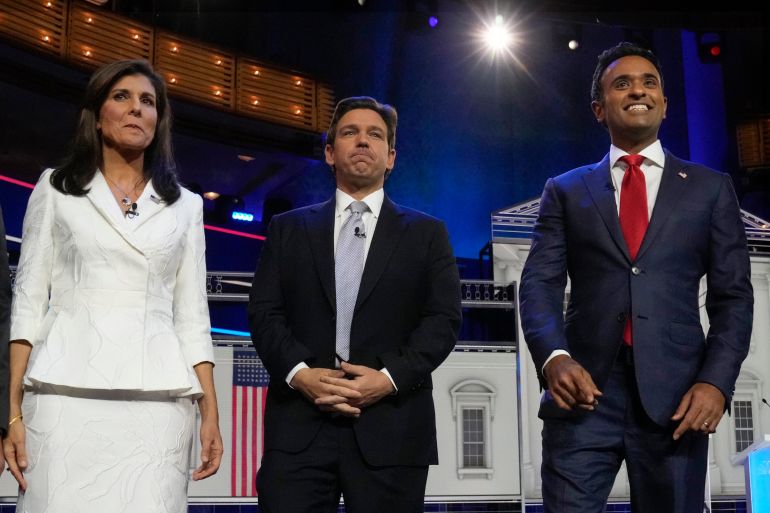
Only six weeks remain before Republican presidential hopefuls face the first major test of the United States primary season: the Iowa caucuses. A victory in the state could set the tone for the rest of the race.
It is a pivotal juncture. And it is at this moment — with the caucuses looming — that the fourth Republican debate is set to unfold.
Keep reading
list of 3 itemsDebate or no debate, Trump still commands the 2024 Republican race
Fourth US Republican presidential debate: Who will attend, where to watch
But Wednesday’s debate will mark a shift in tactic. Whereas the previous three debates took place on mainstream news networks, the latest edition has landed on a lesser-known platform: the 24-hour cable-news channel NewsNation.
Last year, the media research firm Nielsen ranked NewsNation 107th on its list of most-watched television networks, far behind previous debate hosts like top seed NBC and Fox News at number four.
But experts say choosing NewsNation was strategic. Not only does it signal a rebuke to mainstream media, but it could also serve as a gesture to the current frontrunner for the Republican nomination, Donald Trump.
The former president is a prominent critic of platforms like Fox News and has skipped every debate so far this election season, in part citing dissatisfaction with the debate hosts.
“It very well might be the case that the GOP is acceding to Trump’s pressure,” said Patrick A Stewart, a professor of political science at the University of Arkansas.
“What this move in practice will arguably do is diminish the reach of the contenders on stage and protect Donald Trump’s position as leading candidate for the GOP nomination.”
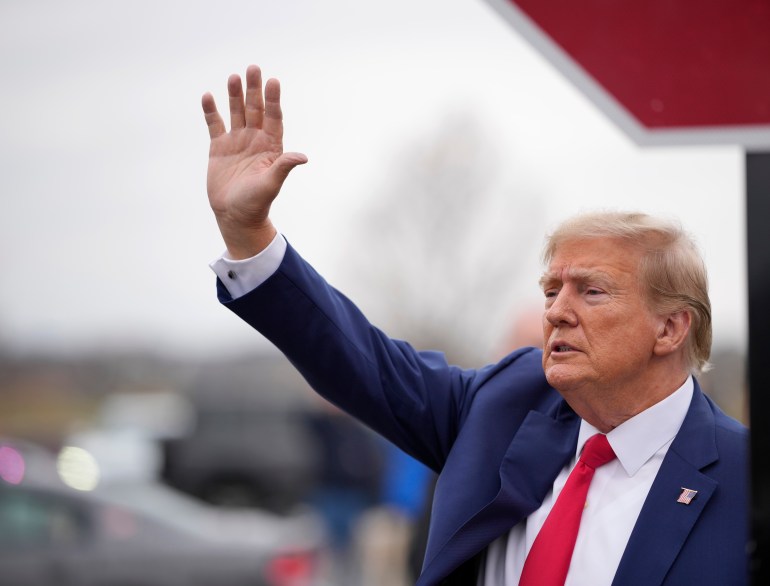
A ‘kiddie table’ for Trump’s rivals
Ever since Trump announced his candidacy in November 2022, he has led the Republican field by seemingly insurmountable margins. An estimated 60 percent of Republicans support him, according to a poll released on Monday by NewsNation and Decision Desk HQ.
His next closest rival, Florida Governor Ron DeSantis, is a distant second with 11-percent support, followed by former United Nations Ambassador Nikki Haley at 10 percent.
Neither has ever climbed close to Trump’s numbers in any national poll. DeSantis and Haley will be joined on Wednesday’s debate stage by two other long-shots: entrepreneur Vivek Ramaswamy and former New Jersey Governor Chris Christie.
Stewart indicated the choice of a smaller platform — as well as Trump’s continued absence from the debate stage — can be understood as a slight to his four nearest rivals.
“To a certain extent, this can be seen as relegating the current four debate-active candidates to the kiddie table,” he said.
But the debate’s lower profile offers an advantage to the Republican Party as a whole, Stewart added. It helps the party appease Trump, while blunting any criticisms he might face from the debate stage.
Trump’s campaign had previously called on the Republican Party to cancel all remaining debates, “in order to refocus its manpower and money on preventing the Democrats’ efforts” to retain the White House in 2024.
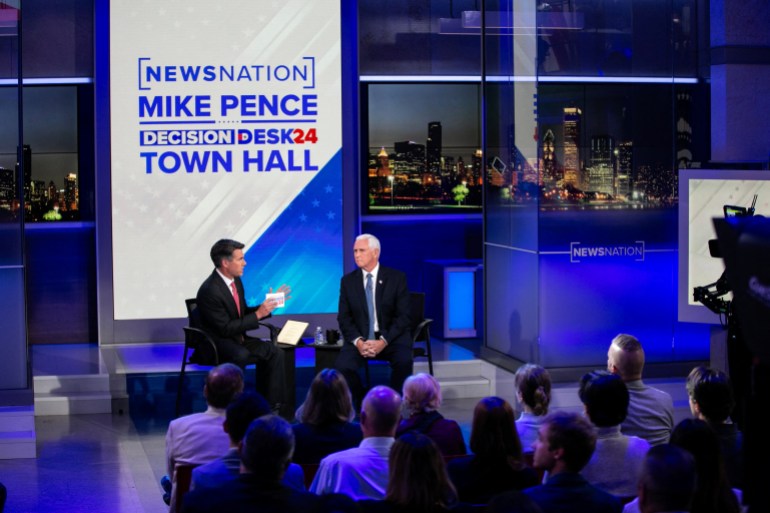
Eroding trust in media
Trump has long had a fractious relationship with Republican leadership, even threatening in the past to split from the party and run as an independent.
But the Republican Party increasingly reflects Trump’s own views, including about the media.
Trump’s refusal to participate in the debates stems, in part, from his vocal opposition to mainstream platforms. Earlier this year, he accused Fox News — one of this year’s previous debate hosts — of suppressing his poll results.
“Why doesn’t Fox and Friends show all of the Polls where I am beating [President Joe] Biden, by a lot. They just won’t do it!” Trump wrote on social media. “And then they want me to debate.”
Over the years, Trump has made a habit of blasting media outlets he perceives as unsympathetic to his leadership, calling them “corrupt”, “fake” and an “enemy of the people”.
That rhetoric has been absorbed into the broader Republican field. During the last debate, Trump’s rival Ramaswamy echoed his talking points, including his false allegations of election fraud.
“This is about you in the media and the corrupt media establishment,” Ramaswamy said from the stage, speaking directly to moderators from the host network NBC. “We need accountability, because this media rigged the 2016 election. They rigged the 2020 election.”
That suspicion has trickled down into the electorate. An Associated Press-NORC poll from May showed that 60 percent of Republican adults have little to no trust in news media, compared to 26 percent for Democrats.
Just as many Republicans — 61 percent — felt the news media was “doing more to hurt democracy” than protect it.
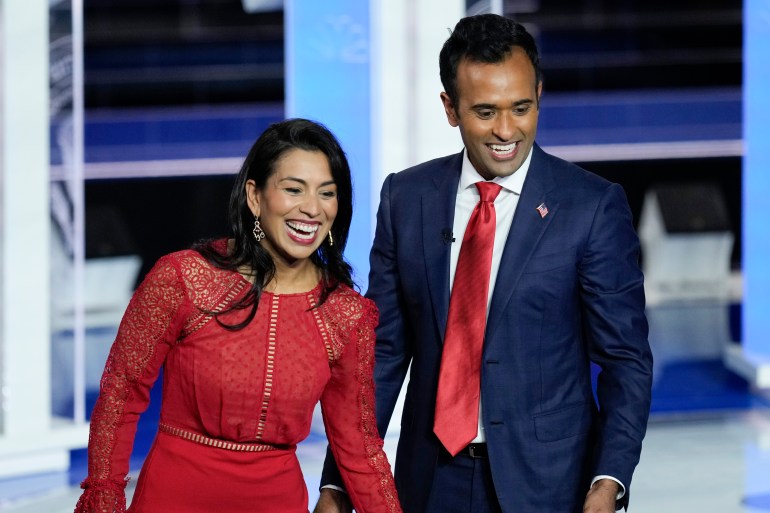
‘Getting away’ from big-name corporations
The Republican Party has responded to those fears with its choice of debate hosts for the 2024 race, mixing mainstream platforms with smaller, more conservative-leaning startups in an effort to reach wider audiences.
For instance, Republican National Committee Chairwoman Ronna McDaniel announced in April that every debate would be livestreamed on Rumble, an online video platform popular among conservatives.
“We’re getting away from Big Tech,” McDaniel explained on the TV show Fox & Friends, citing the more mainstream platform YouTube as an example.
For Stewart, that decision reflects a growing disillusionment with the reigning media powerhouses, many of which are owned by a relatively small number of conglomerates. Even conservative bastion Fox News is part of the larger Fox Corporation, which operates a slate of broadcasting services.
“The movement by the current Republican Party from traditional media outlets, including Fox News, to the much lesser-known NewsNation — as well as Rumble instead of YouTube — may be portrayed as a declaration of independence from the mainstream media,” he said.
But those choices come with costs. Like NewsNation, Rumble has a much smaller viewership than its larger competitors. It registered 58 million monthly active users in the third quarter of 2023, a number dwarfed by the more than two billion monthly users YouTube reported earlier this year.
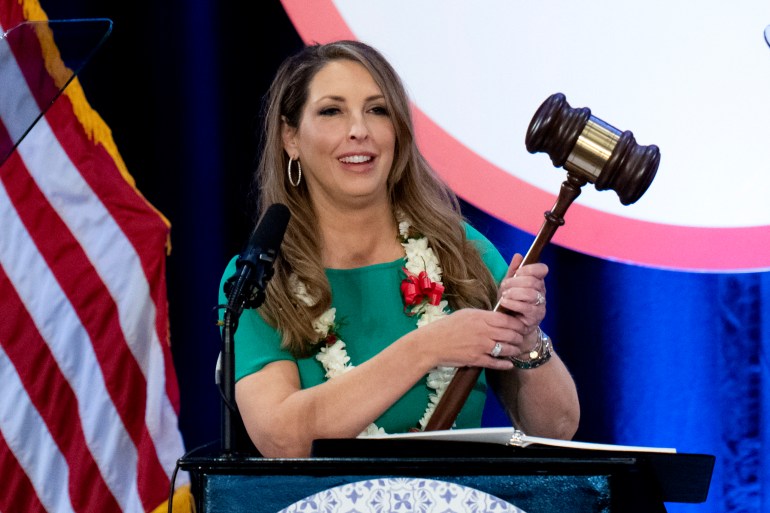
A boon to the network
Still, the switch to a platform like NewsNation could pay dividends, according to Josh C Bramlett, a professor at the University of Alabama who studies political communication.
“The party can reach out to the voters who represent the audience of a news network. They can target specific segments of voters who consume that media,” Bramlett explained.
The relationship can be mutually beneficial for networks like NewsNation, he added. “The network can promote its brand and be the centre of the political news world.”
For its part, NewsNation, owned by the media conglomerate Nexstar Media Group, advertises itself as an “unbiased” alternative to its bigger rivals.
It has made a point of scooping up on-air talent let go by other networks, a fact demonstrated by its choice of debate moderators: former ABC anchor Elizabeth Vargas and Megyn Kelly, previously of Fox News and NBC.
Ultimately, some experts believe the biggest winner of Wednesday’s debate could be NewsNation itself, as it launches itself into the political big leagues.
Michael X Delli Carpini, an emeritus professor at the University of Pennsylvania, pointed out that the first three Republican debates have drawn between 7.5 and 12.8 million viewers apiece.
“While I doubt that the upcoming debate will approach these numbers, almost certainly NewsNation will significantly exceed their current viewership,” Delli Carpini said. He noted the network usually averages between 76,000 and 117,000 prime-time viewers a night.
“The big question for them is whether any new viewers return to the network,” Delli Carpini continued. But he believes the outlook is optimistic: “I suspect that a number of them will.”